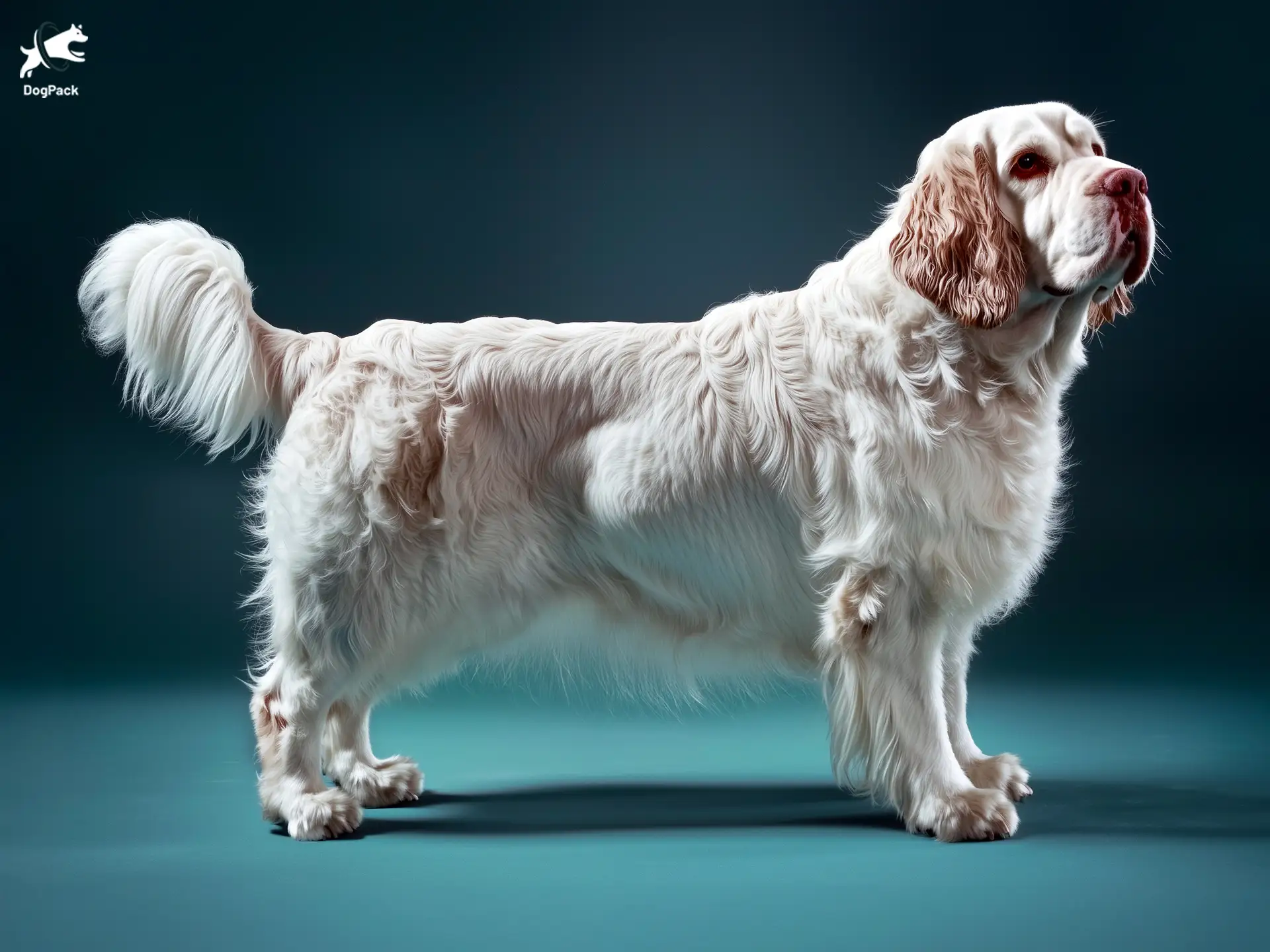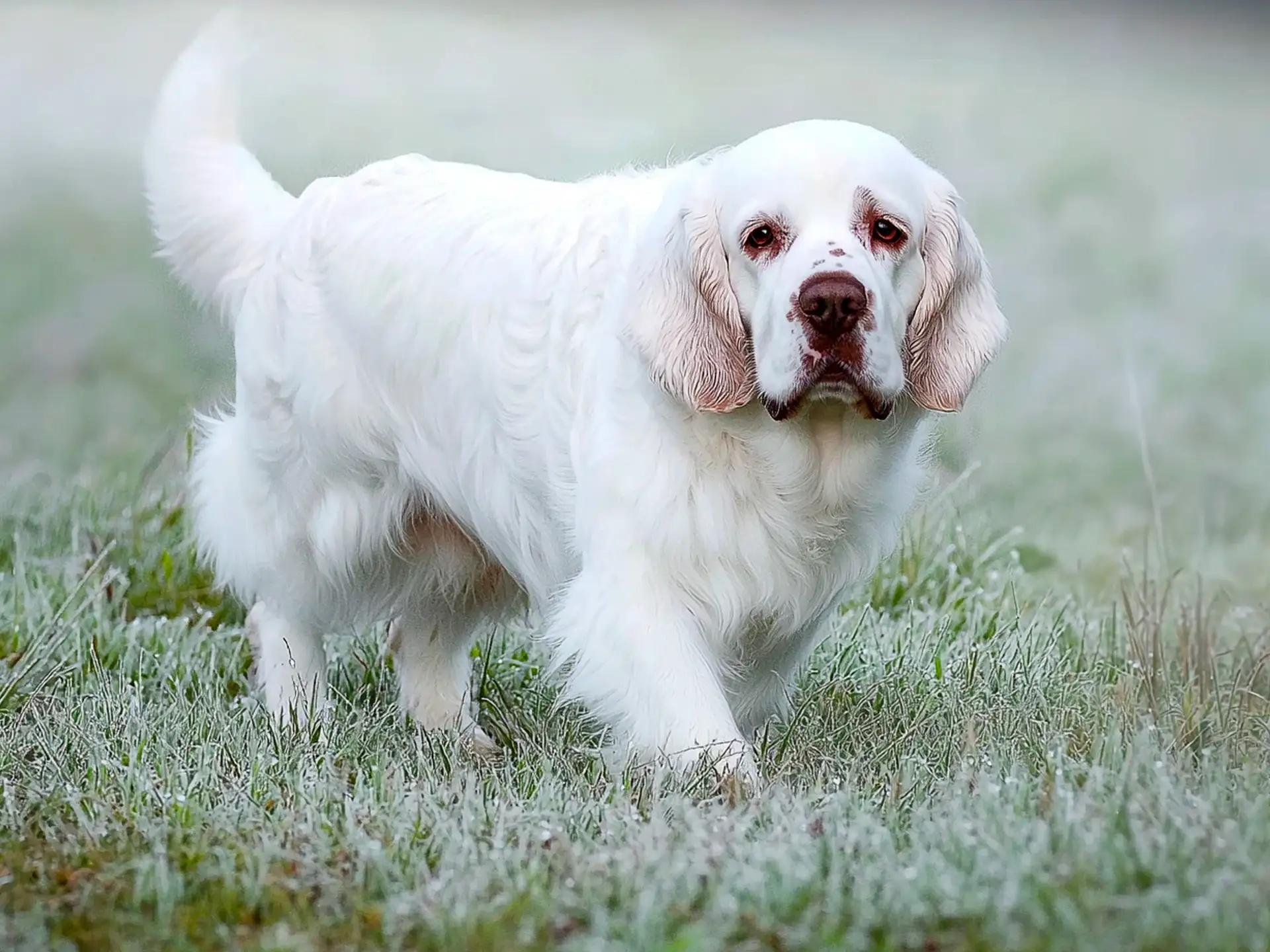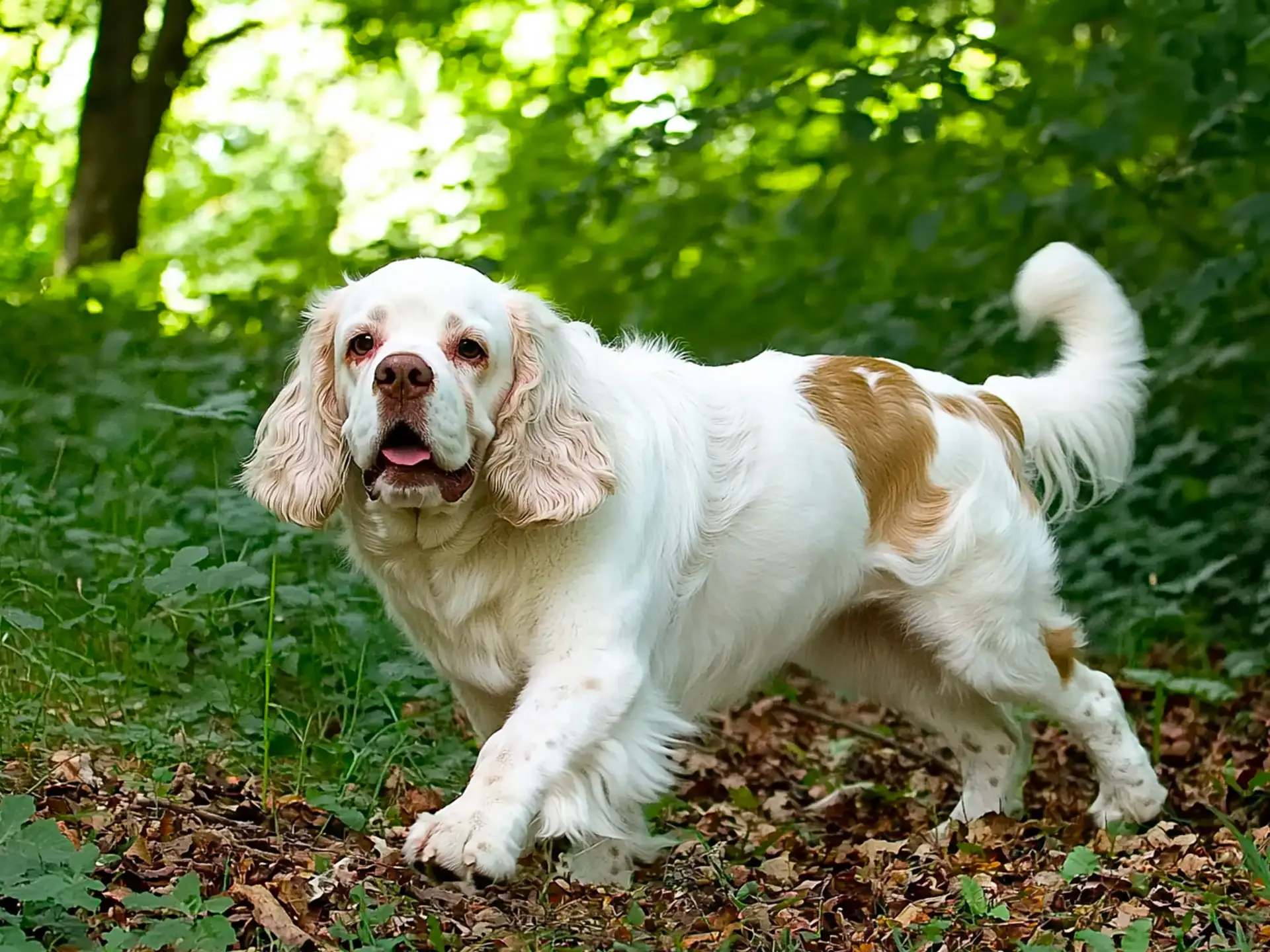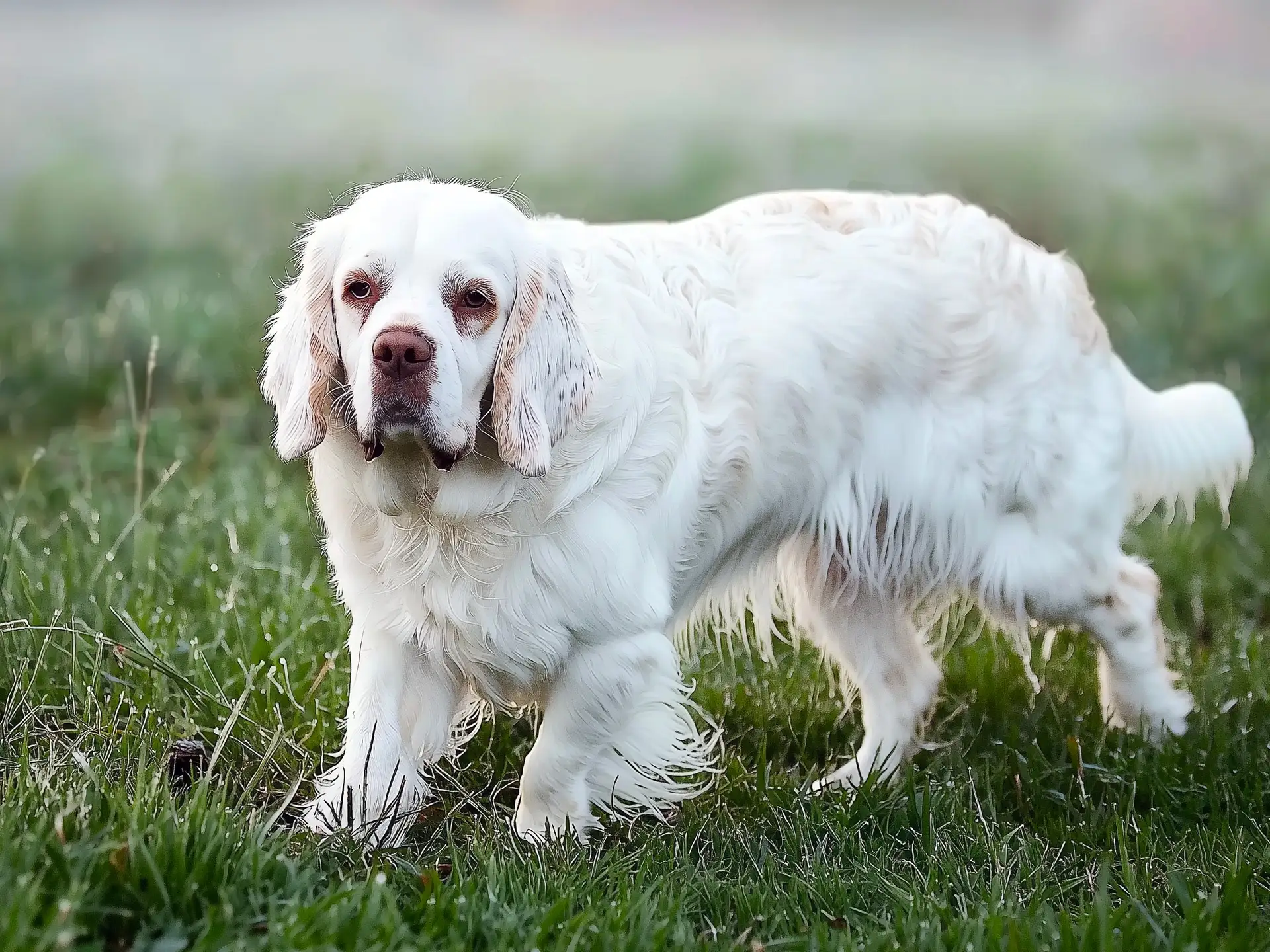Clumber Spaniel Dog Breed Info & Overview
The Clumber Spaniel, the largest of the spaniel breeds, is cherished for its gentle, affectionate nature and calm demeanor. Originally bred for bird hunting, this sturdy breed combines strength with a relaxed, family-friendly personality. Loyal and loving, Clumber Spaniels make ideal companions, bringing a sense of tranquility and warmth to any household.
Characteristics
Pictures
Breed History
The Clumber Spaniel traces its roots back to 18th-century England, where it was favored by British nobility for its exceptional hunting abilities. Legend has it that the breed was developed at Clumber Park in Nottinghamshire, giving rise to its unique name. These dogs were bred to be powerful yet slow-moving, making them ideal for accompanying hunters on foot through dense underbrush.
During the French Revolution, it’s said that the Duke of Noailles sent his prized spaniels to the Duke of Newcastle in England for safekeeping, contributing to the Clumber Spaniel’s lineage. Over time, the breed gained popularity among the English elite, including King George V, who was an avid Clumber enthusiast. Their steady temperament and excellent scenting abilities made them indispensable in the field.
Despite their noble beginnings, Clumber Spaniels faced a decline in numbers after World War II due to decreased demand for hunting dogs. Dedicated breeders worked tirelessly to revive the breed, and today, while still relatively rare, Clumber Spaniels are cherished for their historical significance and endearing qualities. The breed was officially recognized by the American Kennel Club in 1878, one of the earliest to be registered.
Temperament, Personality
Clumber Spaniels are known for their gentle and affectionate nature, making them wonderful companions for families and individuals alike. They possess a dignified demeanor and are often described as being a bit more reserved than other spaniel breeds. Their calm disposition means they’re unlikely to bounce off the walls, but they still enjoy playtime and engaging with their loved ones.
These dogs are typically friendly towards other animals and can coexist peacefully with pets when properly socialized. They are not overly demanding but appreciate attention and will happily lounge by your side for hours. Clumbers are intelligent and have a strong desire to please, which can make training a rewarding experience.
While they might be a bit aloof with strangers at first, Clumber Spaniels usually warm up quickly once they sense there’s no threat. They are not known for being aggressive but can be protective of their family if the situation calls for it. Their easygoing personality makes them well-suited for households that prefer a quieter canine companion.
Physical Characteristics
Clumber Spaniels are the largest of the spaniel breeds, boasting a substantial build with a deep chest and strong bones. They have a distinctive appearance, characterized by a broad head, square muzzle, and large, expressive eyes that convey a thoughtful expression. Their heavy brow and loose skin give them a somewhat droopy look, adding to their unique charm.
Their coat is dense, straight, and weather-resistant, predominantly white with lemon or orange markings, especially around the ears and face. This coloration helped hunters spot them easily in the field. The breed’s low-set ears are broad and feathered, framing their face elegantly. Their sturdy legs and muscular build enable them to move through thick underbrush with ease.
Clumber Spaniels have a long body and a tail that is typically docked in countries where the practice is allowed. They carry themselves with a purposeful gait, reflecting their working heritage. Despite their size, they are not overly active indoors and can adapt well to various living environments, provided they receive adequate exercise.
Health Issues
Like all breeds, Clumber Spaniels are prone to certain health conditions. Hip dysplasia is a common concern due to their size and build, which can lead to mobility issues if not addressed. Regular veterinary check-ups and maintaining a healthy weight are essential in mitigating this risk. Eye problems such as entropion or ectropion may also occur, requiring medical attention.
Intervertebral disc disease is another condition that can affect Clumbers, given their long backs. Owners should be cautious about activities that may strain their spine, avoiding excessive jumping or rough play. Ear infections can be an issue due to their droopy ears, so routine ear cleaning is recommended to prevent complications.
Some Clumber Spaniels may experience a condition called pyruvate dehydrogenase phosphatase 1 deficiency (PDP1), a genetic disorder affecting muscle function. Responsible breeders should test for this condition to ensure healthy litters. Overall, with proper care and regular health screenings, many Clumbers lead full, happy lives.
Grooming Needs
The Clumber Spaniel’s dense coat requires regular grooming to keep it in top condition. Brushing two to three times a week helps prevent matting and reduces shedding around the home. During seasonal shedding periods, more frequent brushing may be necessary to manage the increased hair loss.
Bathing should be done as needed, typically every six to eight weeks, using a dog-friendly shampoo to maintain their coat’s health and shine. Pay special attention to areas prone to dirt and debris, such as their ears and paws. Their feathered ears can collect moisture and lead to infections if not kept clean and dry.
Regular nail trimming is important, as overgrown nails can cause discomfort or affect their gait. Dental hygiene shouldn’t be overlooked; brushing their teeth several times a week can prevent tartar buildup and promote overall health. Consistent grooming routines not only keep Clumber Spaniels looking their best but also provide an opportunity to check for any skin issues or parasites.
Exercise Requirements
While Clumber Spaniels are not the most energetic of breeds, they do require daily exercise to stay healthy and happy. A moderate walk of 30 to 45 minutes is typically sufficient to meet their needs. They enjoy exploring and have a keen sense of smell, so incorporating scent-based games can be particularly rewarding.
Despite their laid-back nature, Clumbers can be surprisingly enthusiastic about activities like fetch or swimming. However, it’s important to monitor them in warm weather, as they can be prone to overheating due to their dense coat and stocky build. Always provide access to fresh water and shade during outdoor activities.
Exercise not only keeps them physically fit but also mentally stimulated. Without adequate activity, Clumber Spaniels may become bored, which can lead to undesirable behaviors. Interactive toys and puzzle feeders can help keep their minds engaged, especially when left alone for extended periods.
Training Tips
Clumber Spaniels are intelligent and eager to please, which generally makes training a positive experience. However, they can exhibit a stubborn streak, so patience and consistency are key. Utilizing positive reinforcement techniques, such as treats and praise, will yield the best results and strengthen the bond between you and your dog.
Early socialization is important to help Clumbers become well-adjusted adults. Exposing them to a variety of people, environments, and other animals can reduce any tendencies toward shyness or aloofness. They respond well to gentle guidance and can be sensitive to harsh corrections, so maintaining a calm and encouraging demeanor is beneficial.
Due to their strong sense of smell and hunting instincts, Clumber Spaniels may become distracted by scents during training sessions. Keeping sessions engaging and varied can help maintain their focus. Incorporating scent work or tracking games can also satisfy their natural inclinations and make training more enjoyable for both of you.
Nutrition, Diet
Feeding a Clumber Spaniel requires attention to portion control due to their propensity for weight gain. A high-quality dog food formulated for large breeds with moderate energy levels is recommended. Adult Clumbers typically consume between 2.5 to 3.5 cups of food per day, divided into two meals to aid digestion and prevent overeating.
Protein-rich diets support their muscular build, while moderate fat content helps maintain a healthy weight. Be cautious with treats and table scraps, as these can quickly add unnecessary calories. Consulting with your veterinarian can help tailor a diet plan that meets your Clumber’s specific nutritional needs based on age, activity level, and health status.
Some Clumber Spaniels may have food sensitivities or allergies, so monitoring their reactions to different foods is important. Incorporating supplements like glucosamine and chondroitin can support joint health, especially given their susceptibility to hip dysplasia. Always ensure fresh water is available to keep them hydrated.
Adoption, Breeders
If you’re considering adding a Clumber Spaniel to your family, it’s important to seek out reputable breeders who prioritize health and temperament. Responsible breeders will provide health clearances for hip dysplasia, eye conditions, and PDP1 deficiency. Visiting the breeder and meeting the puppy’s parents can offer insights into the dog’s potential traits.
Alternatively, adopting from a rescue organization is a wonderful option. The Clumber Spaniel Club of America Rescue and Placement program works to find homes for Clumbers in need. Adoption not only gives a dog a second chance but also provides you with a companion who may already have some training.
Be wary of puppy mills or breeders who cannot provide proper documentation and health guarantees. Investing time in finding the right source ensures you bring home a healthy, well-adjusted Clumber Spaniel. Whether through adoption or a breeder, this breed can make a delightful addition to the right household.
Family Pet?
Clumber Spaniels make excellent family pets due to their gentle and affectionate nature. They are patient with children and can form strong bonds with all family members. Their calm demeanor means they’re less likely to be overwhelmed in a bustling household, and they often enjoy participating in family activities.
While they may not be as boisterous as some breeds, Clumbers are always up for a game or a cuddle on the couch. They tend to get along well with other pets, especially when introduced properly. Their low-key energy level makes them suitable for families who prefer a more relaxed companion.
It’s important to teach children how to interact respectfully with the dog to ensure positive relationships. Supervision is recommended during playtime to prevent any accidental injuries due to the dog’s size. Overall, Clumber Spaniels thrive in a loving home where they are considered part of the family.
Right For You?
Deciding if a Clumber Spaniel is right for you involves considering your lifestyle and what you’re looking for in a canine companion. If you value a calm, affectionate dog that doesn’t require excessive exercise, the Clumber might be a perfect fit. They are well-suited for individuals or families who can provide moderate activity and plenty of love.
However, be prepared for regular grooming and a fair amount of shedding. If you’re meticulous about keeping a spotless home, this breed’s shedding might pose a challenge. Additionally, their propensity for weight gain means you’ll need to be diligent about their diet and exercise routines.
Clumber Spaniels do best in homes where they won’t be left alone for long periods, as they thrive on companionship. If you can offer a stable, loving environment and are willing to meet their grooming and health needs, a Clumber Spaniel could be a wonderful addition to your life.
Conclusion
With their gentle disposition and loyal nature, Clumber Spaniels make exceptional companions for those seeking a relaxed yet affectionate dog. They blend well into family life and are equally content in the company of singles or seniors. While they require regular grooming and mindful feeding practices, the rewards of sharing your home with a Clumber Spaniel are plentiful. If you’re prepared to meet their needs, this breed could be the perfect addition to your household.
FAQs
-
Do Clumber Spaniels bark a lot?
Clumber Spaniels are generally not excessive barkers. They are relatively quiet dogs who will bark to alert their owners if something is amiss but are not known for nuisance barking. This makes them suitable for quieter living environments.
-
Are Clumber Spaniels good apartment dogs?
While Clumber Spaniels are larger dogs, their low energy levels indoors make them adaptable to apartment living, provided they receive regular outdoor exercise. They are calm and quiet, which can be advantageous in close living quarters.
-
How much do Clumber Spaniel puppies cost?
Clumber Spaniel puppies can be quite expensive due to their rarity, with prices ranging from $1,500 to $3,000 or more from reputable breeders. Costs may vary based on lineage, breeder reputation, and availability.
-
Do Clumber Spaniels get along with cats?
Clumber Spaniels can get along well with cats, especially if they’re raised together. Their gentle and easygoing nature generally makes them accepting of other household pets, but proper introductions and supervision are important.
-
Are Clumber Spaniels hypoallergenic?
No, Clumber Spaniels are not hypoallergenic. They have a dense double coat and are heavy shedders, which can trigger allergies in sensitive individuals. Regular grooming can help manage shedding but won’t eliminate allergens.
Breed Ratings
Clumber Spaniels are intelligent and can learn quickly, especially when training is consistent and positive.
They enjoy playtime but are not overly exuberant, making them suitable for families seeking a more laid-back companion.
With moderate energy, they require daily walks but are generally calm indoors and adapt well to a relaxed lifestyle.
Clumbers shed quite a bit, especially during seasonal changes, so regular brushing is needed to manage loose hair.
Originally bred for hunting, they have a moderate prey drive but are less intense than some other sporting breeds.
Their dense coat requires frequent grooming to prevent matting and manage shedding, demanding a fair amount of effort.
Eager to please and intelligent, Clumber Spaniels respond well to positive reinforcement and consistent training methods.
They prefer companionship and may become bored or anxious if left alone for extended periods.
Generally quiet, they are not prone to excessive barking, making them suitable for quieter environments.
Clumbers can drool, especially after eating or drinking, so be prepared for some slobber.
With proper socialization, they typically get along well with other dogs and enjoy canine company.
Prone to certain health issues like hip dysplasia and eye conditions, but with proper care, they can be healthy companions.





















